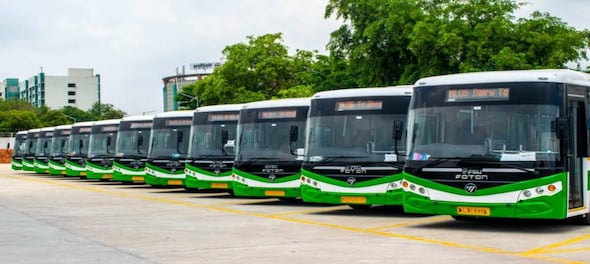
Government-owned Convergence Energy Services Limited (CESL) has selected six commercial vehicle (CV) manufacturers to supply 6,465 electric buses under the country's first e-bus tender of the National Electric Bus Programme (NEBP). NEBP aims to deploy 50,000 e-buses and strengthen the demand for these vehicles nationwide.
Domestic manufacturers like Ashok Leyland's Switch Mobility, JBM Group, Greencell Mobility, Intact Transport, Pinnacle Mobility, and PMI Electro (in consortium with Greencell Mobility and Intact Transport) have been selected as the winning bidders the tender finalised on January 2, 2023.
These manufacturers would supply e-buses to six states - 3,980 units to Delhi, 1,000 to Telangana, 750 to Kerala, 550 to Haryana, 150 to Gujarat and ten e-buses to Arunachal Pradesh. Apart from procuring, operating, and maintaining buses, the service providers (manufacturers or a consortium of manufacturers and bus service providers) also have to develop allied electric and civil infrastructure on a gross cost contract basis.
Operating price
According to CESL's data, the lowest operating price, without any subsidy, for a 12-metre bus was around 54.3 per kilometre (intra-city) and nearly 39.8 per kilometre (intercity). On the other hand, for a nine-metre bus, the same was discovered at around 54.46 per kilometre, and for a 7-metre bus was approximately 61.92 per kilometre.
Also Read: Tamil Nadu offers road tax exemptions on hybrid cars and SUVs, incentives for commercial EVs
Moreover, under the CESL's 'Grand Challenge,' the bidding prices were also kept higher than the previous e-bus tender - an increase of 11 percent for the 12-metre intra-city bus, about 17 percent more for the 12-metre air-conditioned intra-city bus and 9 percent more for the nine-metre standard floor air-conditioned bus.
While the fixed costs involved in e-bus, charger purchase and financing are similar across cities of India, the variable costs differ from one city to another due to staff remunerations, electricity costs etc., noted CESL.
Therefore, for benchmarking price bids across various cities, Delhi was assumed to be the benchmark city for the price discovery, after which the prices would be adjusted from city to city.
The staff cost was considered 30 percent of the cost of operations, and 30 percent of the per kilometre quote was regulated according to different cities in the ratio of to the minimum wage rates of skilled labour in the required city. It should also be noted that the national capital Delhi has the cheapest electricity tariff for electric vehicle charging, around Rs 5.5 per kilometre, including service charges.
Price without subsidy
CESL observed that the prices for e-buses without subsidy are up to 27 percent lower than the current cost of diesel and CNG buses. However, when the subsidies were included, the prices were up to 35 percent lower. The cost savings with or without subsidy for e-buses against diesel and CNG buses without or without subsidy are up to 50 percent.
CESL, in its report for e-bus deployment, stated that the "prices discovered were lower by 28 percent (Surat) to 52 percent (Kolkata) compared to contracted prices under phase-1 of the FAME II program-18 months prior." This ultimately leads to saving more than Rs 10,800 crore over a year of the corresponding contracts.
Check out our in-depth Market Coverage, Business News & get real-time Stock Market Updates on CNBC-TV18. Also, Watch our channels CNBC-TV18, CNBC Awaaz and CNBC Bajar Live on-the-go!


Supreme Court says it may consider interim bail for Arvind Kejriwal due to ongoing Lok Sabha polls
May 3, 2024 4:57 PM
10% discount on fare on Mumbai Metro lines 2 and 7A on May 20
May 3, 2024 2:40 PM

